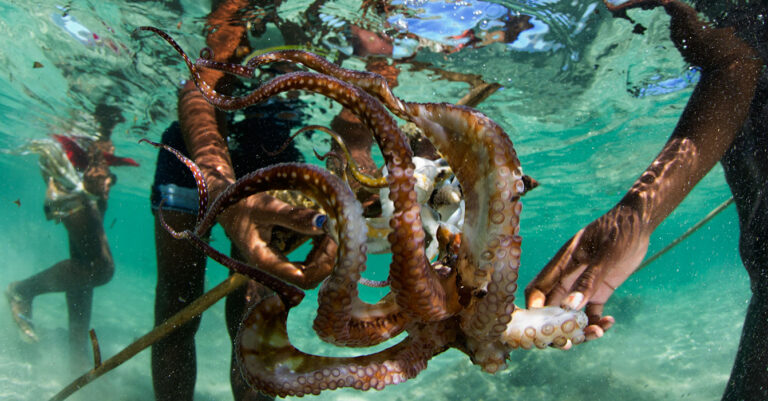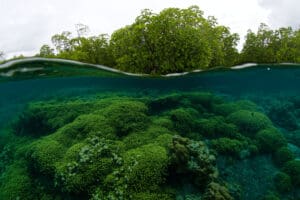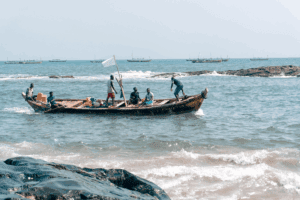Small-scale fishing communities from Pombwe in Tanzania have taken the lead in setting up octopus fishery closures after a six-year hiatus. The two newly closed fisheries signal a proactive shift in attitude and buy-in by the communities to enhance and boost their returns from octopus fishing, a crucial source of income and food. These communities set an example for sustainable fishing practices, demonstrating that communities can lead fisheries management and conservation efforts.
“Before the closures, communities resisted establishing them due to past historical injustices associated with no-fishing zones seen as a barrier to fishing, but peer learning is changing this,” – Khamis Juma, partner support coordinator for Blue Ventures in Tanzania, who co-facilitates learning visits for community representatives to catalyse learning.
Our partner Mwambao facilitated a learning visit to Kuukuu village in Pemba island, Tanzania using an approach known as “Mwamba Darasa”. “Mwamba Darasa”, which means reef class in Swahili, uses closed reef areas to demonstrate the benefits of closures and encourage community participation in establishing fishery closures. The learning approach used octopus fishing as an entry point for communities to learn about closures and was developed following a peer-learning trip between communities from Kilwa in southern Tanzania to Pemba in Zanzibar.
“The communities chose to set up the closure to maximise returns from octopus fishing which is a high-value fishery,” – Haji Machano, partner support coordinator for Blue Ventures in Tanzania.
Octopus fishery closures prohibit fishing activities in a designated area for a specific period, providing protection and conservation measures for marine life and habitats leading to increased yields and more catch for fishers. Recent research shows that tropical small-scale octopus fisheries closures benefit communities by contributing to food security and providing a means to earn their livelihood.
“During the closure period, fishers who previously earned less from fishing in areas without closures received better returns from catching and selling bigger octopus and other high-value species like lobsters that migrate to the closures. For example, lobsters retail at 100,000 shillings per kilo, which is higher than other fish. Such earnings encourage other communities to set up fishery closures,” – Juma.
In addition to food security and sustaining communities’ livelihoods, reef closures help improve marine ecosystem management effectiveness. Environmental education and awareness empower communities to understand the importance of protecting their marine areas and lead to locally led decision making.
“Thanks to our support, communities understand that fishery closures allow them to have a more bountiful catch over a longer period. Fishery closures also allow communities to lead efforts in managing their environment while participating in conservation,” – Machano.
The success of reef closures serves as an example of the positive impact that community-led conservation efforts can have. Communities can manage the closures by combining modern fishery management styles with indigenous knowledge of their environment. Coastal communities can lead efforts to secure a sustainable future for our oceans.
Read more about reef closures and octopus fisheries management as catalysts for conservation.


















